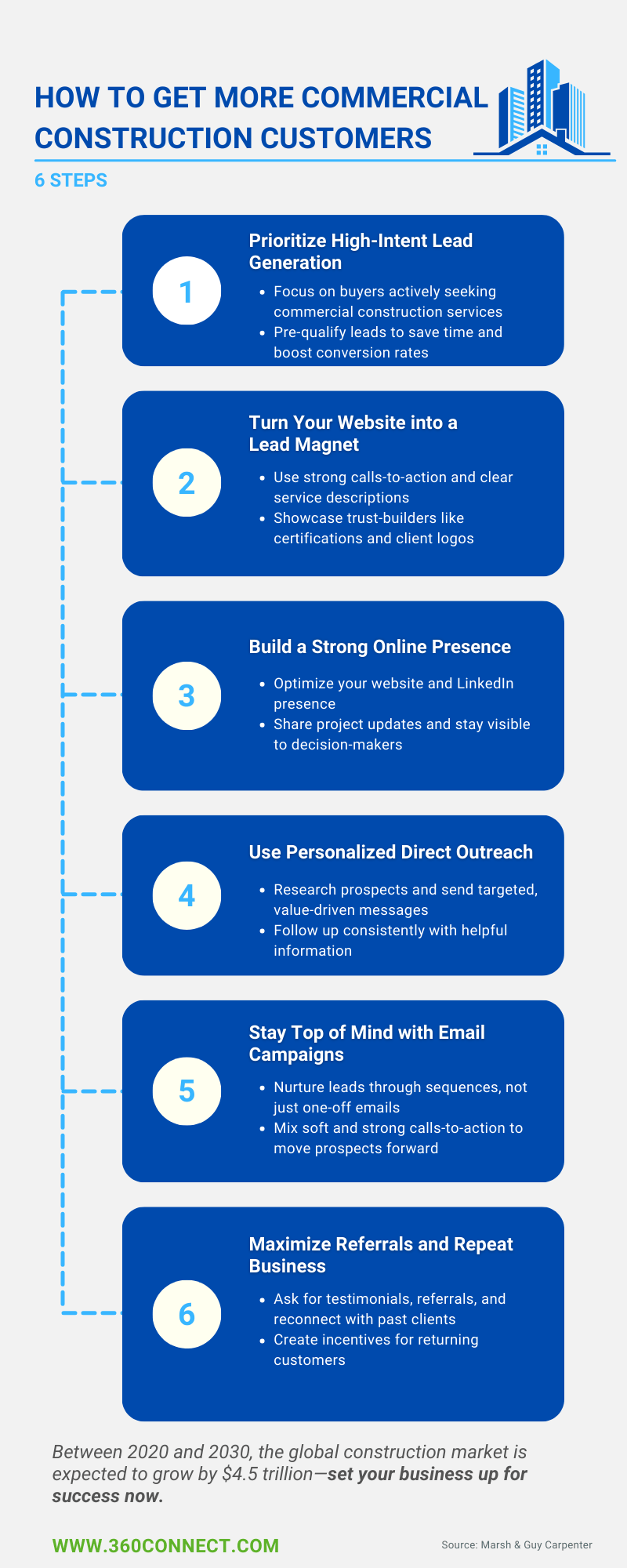In the world of commercial construction, landing consistent, high-value projects is what keeps your business thriving. But let’s face it—getting new commercial construction customers isn’t always easy. With long sales cycles, competitive bidding, and industry relationships playing a big role, it takes more than just great work to grow. The good news? With the right strategies in place, you can attract more leads, win more projects, and build lasting relationships that drive steady growth.
In this blog, we’ll walk you through smart, actionable ways to get more commercial construction customers—whether you’re looking to expand into new markets or strengthen your pipeline in current ones.
Know Your Ideal Customer
Before you can attract the right commercial construction customers, you have to know who they are. Are you targeting general contractors, property developers, or government agencies? Do you specialize in office buildings, industrial warehouses, or healthcare facilities? Understanding your niche and the challenges your buyers face allows you to tailor your marketing, proposals, and outreach accordingly—and even uncover cross-sale opportunities.
Start by identifying:
- The industries you serve best
- The typical project size or budget range
- Common pain points your customers face (e.g., scheduling delays, cost overruns)
- What makes your services stand out from competitors
- Additional services or project types you can offer to the same client (cross-sale opportunities)
For example, if you install commercial roofing, can you also bid on repair, maintenance, or expansion projects down the line? Or if you’re building an office, can you also provide site development or tenant build-out services? Understanding the full scope of a client’s needs helps you stay relevant beyond a single project.
Once you have a clear customer profile, every part of your business—from your website to your cold calls—should speak directly to that audience and the many ways you can support them.
Industries That Rely on Commercial Construction
Now that you’ve narrowed in on your ideal customer, it’s important to consider the broader industry landscape. Commercial construction isn’t a one-size-fits-all market. Different industries have different timelines, budget expectations, compliance concerns, and design needs. Knowing where your services are most valuable helps you focus your time, money, and messaging.
Here are some major industries that consistently seek commercial construction support:
- Healthcare: Hospitals, clinics, and medical offices often require large, complex builds that must meet strict codes.
- Retail: From shopping centers to standalone stores, retail builds need speed and flexibility.
- Education: Schools and universities frequently seek modern facilities with energy-efficient features.
- Industrial & Warehousing: These customers prioritize durability, efficiency, and space optimization.
- Hospitality: Hotels, restaurants, and entertainment venues need aesthetic appeal and function.
Understanding these industries helps you:
- Customize your proposals with relevant project experience
- Anticipate and speak to industry-specific concerns (e.g., downtime for a restaurant, compliance for a hospital)
- Develop targeted campaigns and marketing materials
Ultimately, knowing the industries that align with your strengths will help you position yourself as the go-to supplier for their construction needs.
How to Get More Commercial Construction Customers
To truly grow your commercial construction customer base, B2B suppliers need more than a great service offering—they need a steady, predictable system for attracting and converting new business. Below are practical strategies tailored for suppliers that want to stand out, get in front of serious buyers, and keep the work coming.

1. Prioritize High-Intent Lead Generation
Instead of spending time chasing unqualified leads, focus on generating or accessing high-intent buyers—people who are actively looking for commercial construction services right now. This doesn’t happen by chance. You need to be intentional about where your leads are coming from and how they’re vetted.
Ways to improve lead quality:
- Work with reputable lead generation providers who pre-qualify leads before sending them to you
- Set clear criteria for your ideal customer profile and filter inquiries accordingly
- Track where your best customers are coming from so you can double down on those channels
- Use intake forms that ask qualifying questions (e.g., timeline, budget, scope of work)
Not all leads are created equal. Make sure your time is spent on opportunities with real potential.
2. Turn Your Website Into a Lead Magnet
Your website shouldn’t just look good—it should be working hard to convert visitors into customers. Many B2B suppliers in commercial construction make the mistake of treating their website like a brochure. Instead, think of it as your 24/7 sales rep.
Features that help turn clicks into calls:
- Clear, benefit-driven service descriptions with keywords like “commercial construction” naturally placed
- Trust-building elements like certifications, client logos, safety records, or case studies
- Calls-to-action placed throughout (not just on your contact page)
- Fast-loading, mobile-friendly pages that make it easy for busy buyers to navigate
Don’t forget: if a prospect visits your site and can’t find what they need within 10 seconds, they’re moving on.
3. Build a Strong Online Presence
It might be a “boots-on-the-ground” industry, but commercial construction customers still research online before reaching out. In fact, 74% of business buyers do most of their research online before making a purchase. So, if your business isn’t easy to find online, you could be missing out on major opportunities.
How to stand out online:
- Optimize your website with commercial construction keywords and detailed service pages
- Showcase past projects with professional photos, timelines, and results
- Share updates, achievements, and new work on LinkedIn and industry forums
- Keep your Google Business Profile and contact information accurate and current
Being discoverable online isn’t just about marketing—it’s about being accessible when decision-makers need you.
4. Use Personalized Direct Outreach
Direct outreach still has a place in B2B—when it’s done right. It’s not about sending the same generic email to 200 contacts. It’s about crafting targeted, personalized messages that speak to the recipient’s specific needs or upcoming projects.
Tips for effective outreach:
- Research the company before reaching out—mention relevant projects or pain points
- Keep your message short, clear, and focused on value (“Here’s how we helped a similar client finish under budget”)
- Include a compelling subject line or intro that shows you understand their world
- Follow up 2–3 times with helpful information—not just “checking in.” 80% of sales require a minimum of five follow-up calls after the first meeting.
People buy from businesses they trust—and trust is built when you show you’re paying attention.
5. Stay Top of Mind with Email Campaigns
Not every lead converts immediately. That’s why nurturing leads with email campaigns is so important. Whether someone downloaded a pricing sheet or met you at a trade show, staying in touch helps you stay relevant when they’re ready to move forward.
Email campaigns work best when they:
- Offer value (e.g., insights, tips, case studies, project updates)
- Are part of a sequence—not one-and-done emails
- Include a mix of soft and strong calls-to-action (“See our latest project” vs. “Schedule a call”)
- Are mobile-friendly and easy to skim
The more familiar your name is when a project gets greenlit, the more likely you are to get the call.
6. Maximize Referrals and Repeat Business
In commercial construction, reputation and relationships go a long way. Referrals and repeat clients are often your most profitable projects because there’s already a level of trust—and you don’t need to spend as much time convincing them to choose you. Did you know B2B buyers begin their purchasing process with a referral 84% of the time?
Here’s how to get more from your existing network:
- Create a simple referral program (even a thank-you card or gift card can go far)
- Ask satisfied clients for testimonials, reviews, or case studies
- Check in with past clients a few times a year to ask about new needs or projects
- Offer incentives for clients who bring you back for additional work
Sometimes, the easiest way to get a new project is by reconnecting with someone who already knows what you can do.
7. Set Yourself Apart from the Competition
In a competitive industry, how you differentiate your business could be the deciding factor in landing a job. If multiple suppliers offer similar services at similar prices, the buyer is going to choose the one who clearly shows added value.
Tactics to position yourself as the top choice:
- Share detailed project case studies that show how you solved complex problems
- Highlight tech advantages like 3D modeling, scheduling tools, or client portals
- Emphasize your responsiveness—returning calls, delivering quotes, and following through quickly
- Promote safety stats, sustainability efforts, or permitting expertise
Buyers aren’t just buying a service—they’re buying peace of mind. Make sure that’s what you’re selling.
Each of these strategies works better when part of a larger, consistent approach. You don’t need to do them all at once—but choose a few, do them well, and watch your commercial construction customer base grow.
Final Thoughts on Increasing Commercial Construction Customers
Getting more commercial construction customers isn’t about one magic trick—it’s about building a consistent strategy that covers multiple touchpoints. When you combine smart marketing, active outreach, personalized service, and a strong reputation, you set your business up for long-term success.
And there’s never been a better time to focus on growth: between 2020 and 2030, the global construction market is expected to grow by $4.5 trillion, reaching $15.2 trillion. With more opportunities on the horizon, the suppliers that build smart systems now will be the ones leading tomorrow.
Whether you’re booking your first major project or scaling up operations, these strategies can help you stand out and stay competitive in a busy market.
Get Commercial Construction Leads Today!
Want to grow your business with quality commercial construction leads? Join 360Connect’s Supplier Network and connect with high-intent buyers who are actively seeking trusted partners like you. Let us help you build your pipeline and take the guesswork out of growth.

